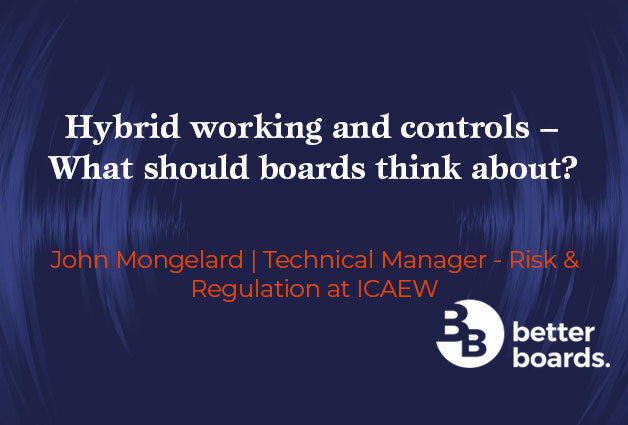Hybrid working and controls – What should boards think about?

The subject of this episode of the Better Boards Podcast Series dealt with “Hybrid working and controls – What should boards think about?” John Mongelard, Technical Manager, Risk & Regulation at the ICAEW, spoke with Dr Sabine Dembkowski.

During the pandemic, we all got used to working virtually. But as restrictions have eased, the discussion is heating up about what the “new normal” looks like. The future of work has arrived. But what do boards need to think about? What does it mean for systems for controls within business?
John leads ICAEW’s programme on financial services issues that have a risk or regulation theme. In his role, he looks at how financial services issues such as misconduct, crypto-currencies, corporate governance and IFRS 9 are influencing financial services firms, their regulators and lending to the real economy.
Some of the key takeaways of the conversation included:
“It’s not been consistent at all.”
With the easing of COVID restrictions, we have seen a number of different approaches to the “new normal” across the financial and professional services sectors.
In some cases, firms are adamant about staff returning to the usual style of office-working. But others have announced adopting a hybrid method of working, or at the very least, giving employees the option to adopt a hybrid working model.
“Sorry Dorothy, you’re not in Kansas anymore.”
The reality of the post-Covid era is that the control environment has moved on. Some staff will be at home and others will be in the office. This will have an impact on the system for supervision and line-managers that were custom to the pure office-based environment.
But it will also have an impact on the systems for staff well-being. Which is important in control systems as exhausted or stressed staff are more likely to make, potentially, less ethical decisions.
“No one wants any surprises, do they?”
The control environment is important for board members to understand as it is a core part of the information systems informing the board. It lets boards now where the business is at and what is keeping their staff members up at night. It connects profitability and staff well-being and should be the system for bringing up issues before they become problems.
Don’t forget to subscribe to never miss an episode of the Better Boards Podcast Series. Available on Apple, Spotify or Google.
To find out how you can take part in the Better Boards Podcast Series or for more information on Better Boards’ solutions, please email us at info@better-boards.com.



